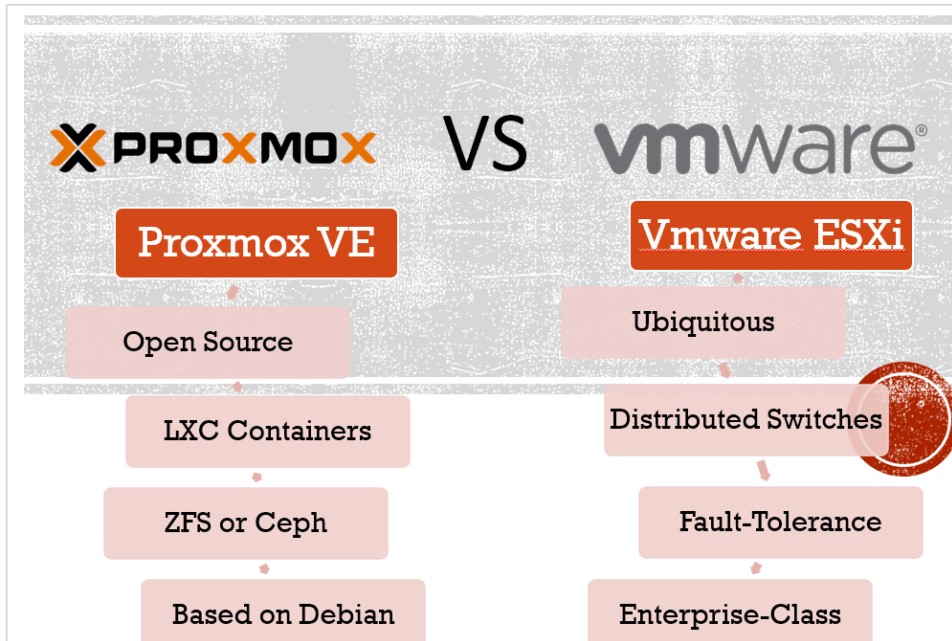Proxmox vs. VMware: Which Virtualization Solution is Right for You?
Virtualization has revolutionized the IT landscape, providing businesses with cost-effective and flexible solutions for managing their IT infrastructure. Two of the most popular virtualization platforms in the market today are Proxmox and VMware. Both offer powerful features and capabilities, but they cater to different needs and use cases. In this blog post, we will compare Proxmox and VMware, highlighting their strengths, weaknesses, and helping you determine which virtualization solution best suits your requirements.
Proxmox: Open Source Simplicity
Proxmox Virtual Environment (Proxmox VE) is an open-source virtualization platform that combines two powerful technologies – virtualization and container-based virtualization (LXC). Its main components include the Proxmox hypervisor (KVM-based) and a web-based management interface.
Some key features of Proxmox include
- Open Source: Proxmox is entirely open-source, making it a budget-friendly option for businesses and tech enthusiasts.
- Web-Based Interface: Proxmox boasts an intuitive web-based interface, simplifying virtual machine (VM) management, and eliminating the need for dedicated client software.
- Container Support: Proxmox supports lightweight Linux containers (LXC), ideal for running multiple isolated applications with minimal resource overhead.
- High Availability (HA): Proxmox offers built-in HA clustering, ensuring seamless VM migration and fault tolerance.
- Community Support: With a thriving community, Proxmox users have access to forums, documentation, and tutorials for troubleshooting and assistance.
VMware: Enterprise-Grade Performance
VMware is an industry-leading virtualization solution known for its robust performance, advanced features, and widespread adoption across enterprises. Its primary offerings include VMware vSphere and VMware ESXi.
Key features of VMware include
- Enterprise-Grade Performance: VMware is renowned for its high-performance virtualization capabilities, ideal for resource-intensive applications and mission-critical workloads.
- Wide Ecosystem: VMware has an extensive ecosystem of tools, plugins, and third-party integrations, offering versatility and integration possibilities.
- Advanced Management Tools: VMware provides a comprehensive set of management tools like vCenter Server, enabling centralized control and efficient resource management.
- Enterprise Support: With enterprise-level support and services, VMware ensures rapid issue resolution and access to expert guidance.
- VMware Cloud Solutions: VMware extends beyond on-premises solutions and offers cloud-based virtualization services through VMware Cloud on AWS and other cloud providers.
Comparison: Proxmox vs. VMware
- Cost: Proxmox’s open-source nature makes it more cost-effective than VMware, especially for small to medium-sized businesses with budget constraints.
- Performance: VMware’s performance capabilities are unmatched, making it the preferred choice for resource-intensive workloads and large-scale enterprise environments.
- Ease of Use: Proxmox’s web-based interface is user-friendly and easy to set up, while VMware may require more expertise and effort to deploy and manage.
- Scalability: VMware’s advanced features and management tools make it more suitable for scaling up to larger infrastructures and complex environments.
- Community Support vs. Enterprise Support: Proxmox relies on its community for support, whereas VMware offers professional support with SLAs for enterprise customers.
Ultimately, the choice between Proxmox and VMware depends on your specific needs, budget, and infrastructure requirements. Proxmox is an excellent choice for smaller businesses or those seeking an open-source, easy-to-use virtualization solution with container support. On the other hand, VMware shines in enterprise settings, offering unparalleled performance, advanced management tools, and extensive third-party integrations.
Carefully assess your organization’s virtualization needs, scalability plans, and technical expertise before making a decision. Whether you opt for the simplicity of Proxmox or the enterprise-grade capabilities of VMware, both platforms promise to enhance your IT infrastructure and streamline your virtualization journey.













